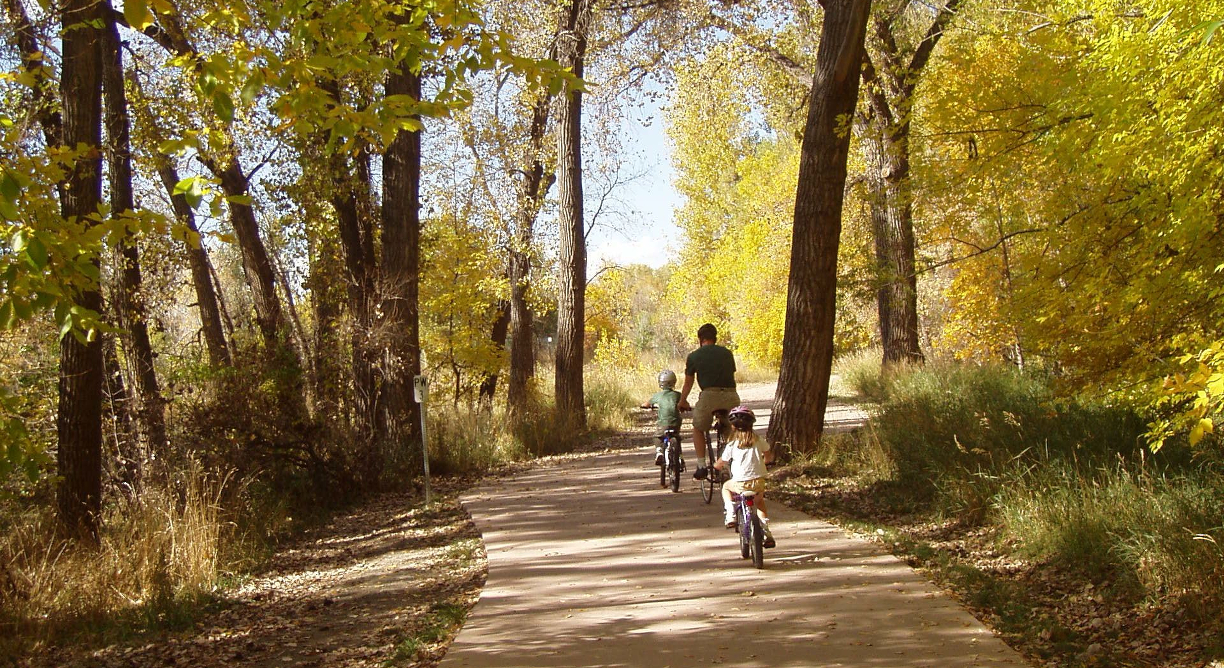
At the intersection of bicycling and faith
by Meg Dunn
[As we continue to roll out our expanded blog content, I’m honored to present our first regular contribution from stalwart local blogger Meg Dunn. I asked Meg to share her insights on the spiritual and religious case for bikes and sustainable transportation. -ED]
I love hanging out down by the Poudre river. The rustle of the leaves in the trees, the music of the birds as they swoop down over the water, and the burble of the river as it wends its way through town somehow soothe the soul. Sometimes I get that same feeling when I’m on my bicycle. The wind on my face, the soft “shush shush” of my feet on the pedals, and the ability to look someone in the eye as I pass them and say, “hello,” all make me feel connected to something much larger than myself. Here I am on my bike. But at the same time, here I am as part of a larger world, a larger community,… as part of Life. It’s a feeling that is at the same time both exhilarating and humbling. It can feel deeply spiritual.
Of course, I don’t always feel this way on my bicycle. When I’m traveling down Mason street with an impatient motorist on my tail, I’m usually not singing hymns or shouting Hallelujahs. It’s at times like that that I’m riding my bike, not because it feels like a spiritual experience, but because my spiritual beliefs speak to my world view. And my world view has led me to make a conscious choice to travel, as often as possible, by foot or by bicycle.
I have a car. With three kids, one husband, and two dogs, all of whom travel with me now and again as we get around town, there are many times when we’ll all pile into the car to get where we need to go. But as a family we’ve made some very deliberate life choices because of our faith that affect how we travel. When we moved here fifteen years ago, we deliberately chose to pay a little more in order to get a house that was located in a walkable neighborhood. We chose to send our kids to our neighborhood schools so we wouldn’t have to drive them back and forth every day. And we attend a church within walking/biking distance.
I said we made these choices because of our faith. Let me explain.
Psalm 24:1 says, “The earth is the Lord’s, and everything in it.” And in the book of Genesis, in the story of creation, it says that the Lord, “took the man and put him in the Garden of Eden to work it and take care of it.” When God made the world, he didn’t just give it to mankind to use for our own purposes. He also put us here to take care of it.
Sure, there’s some level of crap that we can throw into the soil and water and air and somehow the plants and animals and other organisms manage to clean out the junk that we’re putting into the system. But there comes an overflow point where we’re doing more harm than the environment can handle. God has called us to be stewards. We should be treating the land as caretakers. …like it doesn’t belong to us. …like it belongs to God.
So our family does what we can. We decided to reuse and improve our older house rather than tearing it down, throwing it into the landfill, and using newly harvested natural resources to build a new one. We have food gardens in front and in back of our house and we’ve never used herbicides on our grass. We eat organic and local as much as possible. We compost, recycle, keep backyard chickens, support a local CSA, and eat home cooked meals made from minimally processed food items.
And we bicycle.
I’ll fess up right now that we still shoehorn our family into a little sedan to get to church in winter, but as soon as the roads are clear and the weather starts to warm up, we’re out pumping up tires and testing brakes on a Sunday morning so that we can head to the service by bicycle. It feels so much better going to worship God when we haven’t polluted his creation on our way.
So we bike as a means of caring for the planet, but we also bike as a means of caring for ourselves. We’re just as much stewards of our own bodies as we are stewards of the planet. Being fit and healthy is a way of valuing and appreciating the gift of life that God has given us.
Bicycling is also a means of being a more connected part of our community. When you’re traveling around by car, you don’t have opportunities to talk to the person in the car next to you, or the person standing on the street corner, or the person biking past. But when you’re on your bicycle, you can easily stop and chat when you see a neighbor or friend. And I frequently have short interactions with pedestrians and other cyclists when I’m pedaling around. We might just say hello, or talk about the weather. But I’ve also talked to people about their bicycle, they’ve asked me for directions, or we’ve shared concerns about whether the stop light can “see” us or not. All of these interactions are threads that help to make our community feel safer, friendlier, and more people oriented.
Fort Collins is a rapidly growing city, which has led to increased traffic and congestion on the roads. I don’t know about you, but I find traffic to be frustrating and anxiety inducing. Rather than improving my spirits and helping me to connect with those around me, I find it can often do exactly the opposite, leaving me exasperated, angry, and upset with my fellow Fort Collins residents. Jesus said, “By this everyone will know that you are my disciples, if you love one another.” But I tell you what, it is really hard to love my Christian brethren when they and their little fish bumper sticker cut me off in traffic. I think that as a believer, it behooves me to be at the forefront of finding answers to the problems that plague our community. And one answer to the problem of ever increasing traffic is to find alternatives. Transfort service, improved walkability, and safe streets for cyclists are key means of getting angry people out of their cars and helping them to make better, healthier, and friendlier transit choices.
You certainly don’t have to be a spiritual person to advocate for bikes and other forms of alernative transportation in Fort Collins. But if you are a believer, then I think it behooves you to think about how our transportation affects our interactions with one another; how it affects the health, well-being, and safety of the people in our community; and how it relates to our role as stewards of God’s creation. God might not be calling you to sell your car and take up bicycling as your only means of transport. But leaving the car at home a bit more often, and using alternatives means of getting around that are better for the environment, for your health, and for the community, can be an act of service to God and a witness to others.
About Meg Dunn
Meg has been been bicycling for as long as she can remember. Though she did go through a bit of a “Dark Ages” period in the early 1990s when she lived in Detroit, she’s been using a bicycle as an alternative form of transportation since the mid-70s when, as a kid, she realized that a bicycle could get her down the street to the store where candy bars were sold. Though bicycling was a popular form of transport in Ann Arbor and San Francisco, Meg has found that to be less the case in other places where she’s lived… including Fort Collins where bicycling is often seen more as a form of recreation than transportation.
